

AGENDAS
DAY ONE

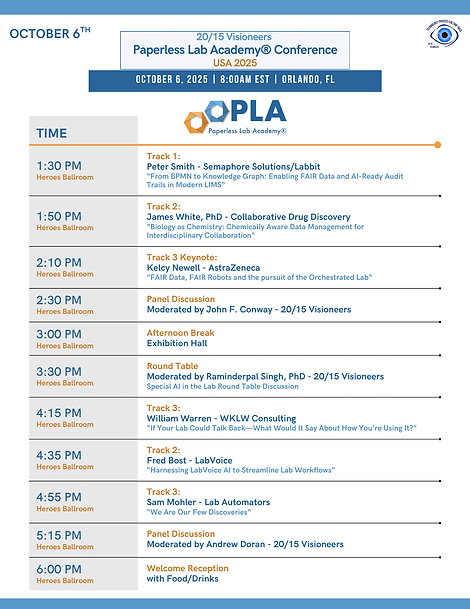.png)
DAY TWO

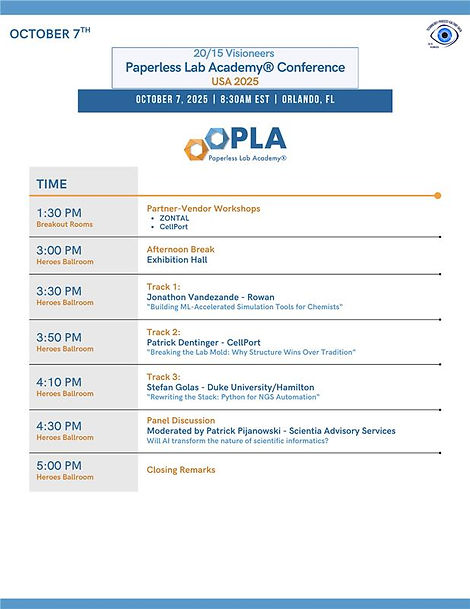.png)
SPONSORS
PREMIUM
.png)
GOLD



SILVER





BRONZE





TRACK THEMES

R&D Success Takes
Culture | Data | Process | Technology
to Make Laboratories Efficient Again

Join us October 5-7, 2025, for a transformative Paperless Lab Academy® (PLA) conference in Orlando, Florida, USA, held in collaboration with 20/15 Visioneers. The event will focus on education and learning the skills necessary to achieve next-generation transformation in your labs and enhancing your personal skill set.
SPEAKERS

Talk Title
Turning Complex Data into Trusted Insights with Data products and LLMs
Norman Azoulay
Vice President- Platforms & Data
Excelra
Talk Title
Automating Lab Processes and Workflows with AWS Agentic AI
Abstract
TBD

Talk Title
Attendees will hear about how current services and solutions leveraging AWS Agentic AI are already capable of automating common lab processes and workflows.
Patrick Combes
Senior Principal of Technology, AWS STT
AWS

David Harburger, Ph.D.
Shareholder
Greenburg Traurig
Talk Title
Building IP as an Asset for the Innovation Life Cycle
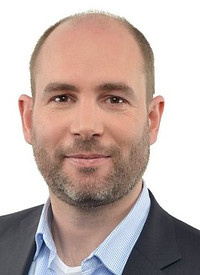
Wolfgang Colsman
CEO
ZONTAL
Talk Title
Smarter Labs, Faster Science: Turning Scientific Data into Predictive Power
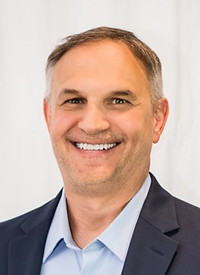
Joseph Dremock
Senior Director
AstraZeneca
Talk Title
AstraZeneca's Next Generation Scientific PMO: From Project Management to Project Leadership

Patrick Pijanowski
Founder & Managing Director
Scientia Advisory Services
Talk Title
PANEL DISCUSSION
Abstract
TBD
Talk Title
TBD
Abstract
TBD

Andrew Doran
Head of Laboratory Robotic & Process Automation
20/15 Visioneers
Talk Title
Beyond the Bench

Talk Title
FAIR Data, FAIR Robots and the pursuit of the Orchestrated Lab
Abstract
TBD
Kelcy Newell, Ph.D.
Robotics & Automation Development & Innovation
Astrazeneca
Talk Title
FAIR Data, FAIR Robots and the pursuit of the Orchestrated Lab
Abstract
TBD

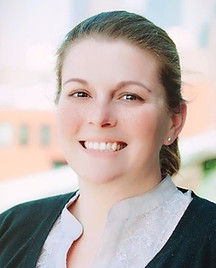
Holly Lynch
Consultant
Lynch Consulting
Talk Title
AI & Lab-in-the-Loop Strategies Redefining Partnerships with Next Gen CROs & TechBio
David Dalgarno
Former SVP, Digital & Data Science Technology
Kojin TX
Talk Title
Making In-Silico First Discovery a Reality: Insights from Integrating Data, Computation, and Technology to Enable Science in Small Biotech

Dr. Raminderpal Singh
Global Head of AI & GenAI Practice
20/15 Visioneers
Talk Title
PANEL DISCUSSION
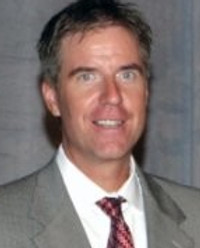
William Warren
Co-Founder & Former VP, Head of Global Antigen Design
WKLW Consulting LLC, Sanofi
Talk Title
If your lab could talk back—what would it say about how you're using it?

Michael Bradfield
Senior Staff Engineer
Takeda
Talk Title
TBD

Patrick Courtney Ph.D.
Leader of Topic Group on Analytical Laboratory Robotics
SiLA
Talk Title
TBD

Fred Bost
Talk Title
Harnessing LabVoice AI to Streamline Lab Workflows
Co-Founder & CEO
LabVoice

Rohit Singh
Head Of Clinical Data Science Visioneering
20/15 Visioneers
Talk Title
From Beside to Approval: The Journey Of Clinical Data Science

Director of Computational Chemistry
Rowan
Talk Title
Building ML-accelerated simulation tools for chemists
Jonathon Vandezande

Peter Smith
CEO
Semaphore Solutions
Talk Title
From BPMN to Knowledge Graph: Enabling FAIR Data and AI-Ready Audit Trails in Modern LIMS

John Conway
Founder & Chief Visioneer
20/15 Visioneers
Talk Title

James White
Collaborative Communications
CDD Labs
Talk Title
Biology as Chemistry: Chemically Aware Data Management for Interdisciplinary Collaboration
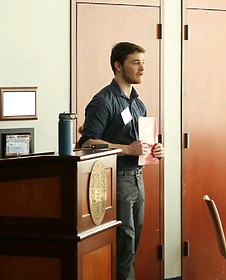
Stefan Golas
Talk Title
Rewriting the Stack: Python for NGS Automation
Student & Intern
Duke University & Hamilton Company
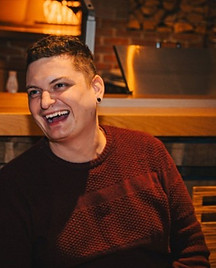
Sam Mohler
Talk Title
We Are Our Few Discoveries
Founder
Lab Automators
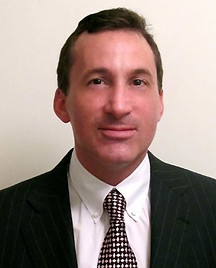
Michael Swartz
Chief Strategy Officer
Dotmatics
Talk Title
Multimodal Informatics from Research through Manufacturing
HANDS ON LABS
Advance your skill set!
Attend an Interactive, Hands-On Lab at Paperless Lab Academy® USA 2025.
Building skills will help you thrive through change. And, as we’ve all witnessed, technology changes from business process management to AI and LLM are coming at us fast and furious. That’s why 20/15 Visioneers has put together four hands-on, interactive labs at The Paperless Lab Academy® USA, October 5-7, 2025.
Seats are limited to 20 registrants/workshop Act now!
Choose from the following topics:
1. Discover Cheminformatics led by Subhas Chakravorty, Ph.D.
The powerful fusion of computational algorithms and chemical expertise transforming modern drug discovery. Learn to digitally encode chemical structures, explore chemical diversity and navigate chemical space, build predictive QSAR and machine learning models, and rapidly analyze bioactivity and ADMET (Absorption, Distribution, Metabolism, Excretion, and Toxicity) properties. Acquire practical skills with Python and RDKit, crucial for drug repurposing, lead optimization, and creating novel molecules with tailored properties. Explore these techniques using datasets derived from current marketed drugs. This structured course takes you from foundational concepts to advanced techniques, providing hands-on expertise essential for pharmaceutical research and molecular innovation.
2. Prompt Engineering for Scientists led by Raminderpal Singh, Ph.D.
Scientists regularly use tools like ChatGPT in work and home. But how do you power-house their use without any software skills? It’s called Prompt Engineering and it’s an art to get right. In this Lab, you'll design the key parameters for a clinical 1 trial for an aging compound! We’ll set you up with best-practice methods, so you won’t be lost. But you will be challenged to build effective prompts. Everything you learn will be reusable back in your workplace (and at home).
3. Business Process Mapping for ELN Optimization led by David Hessler
For thirty years ELN products have been used by research and development labs, and today the still often are not delivering on their promise. Why is this? One answer is that you first need a map of how data is generated, progresses, and is consumed inside and outside your labs. In this workshop, we take a hands-on approach to analysis of the subsystems which produce and analyze data, and we produce easy-to-understand business process mapping which defines the actors, systems, and data which make up the informatics ecosystem. If you want to really leverage the value of an ELN, you need a map which describes the high-quality touch points, and the high risk integrations.
4. Building No-code LLM Workflows for Your Lab led by Raminderpal Singh, Ph.D.
AI adds to automation, and LLMs add to AI. But, without some insider know-how, integrating these tools into experimental workflows can be complex and lead to much technical debt. And when software IT folks are not available, it can be frustrating. In this lab, we’ll get our hands dirty learning about the world of “no-code” LLM tools. This will give you a clear understanding for how they can help you build and run better experiments. We will cover methods to ensure data privacy & security. Coming out of the lab, you will be energized and ready to try out different LLM-based tools in your experiments!
WHERE:
THE FLORIDA HOTEL
1500 Sand Lake Road
Orlando, Florida 32809
Info and Reservations:
Phone Number +1 (407) 859-1500
Conference participants will benefit from special rates by using the link below.
You can also contact the hotel directly and book your room indicating your presence at #PLA2025USA
WHEN:
October 5 - 7, 2025
DISCOUNT:
Discounted hotel booking link here
If the link does not work for you, please call the Florida hotel (+1 (407) 859-1500) and let them know you are booking for the conference.


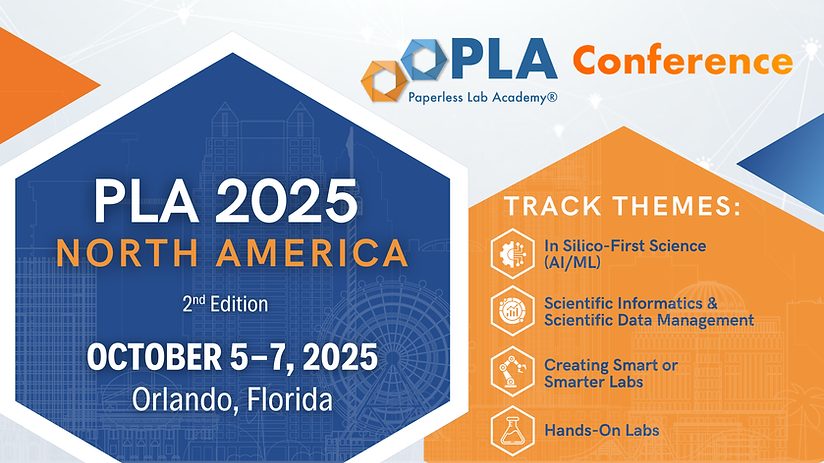.png)

